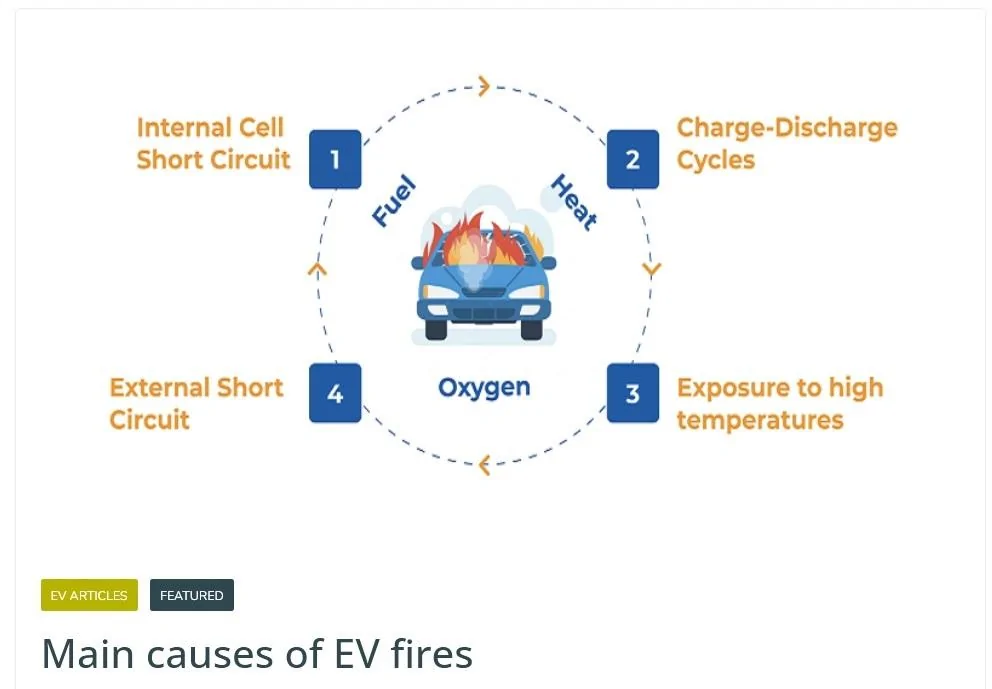chl
Well-known member
- First Name
- CHRIS
- Joined
- Dec 16, 2022
- Threads
- 7
- Messages
- 2,471
- Reaction score
- 1,526
- Location
- alexandria virginia
- Vehicles
- 2023 F-150 LIGHTNING, 2012 Nissan Leaf, 2015 Toyota Prius, 2000 HD 883 Sportster
- Occupation
- Patent Atty / Electrical Engineer
Yes they are rare.
But personally, I'd like to have a zero chance of an EV fire when the EV is doing what EV's normally/are designed to do, that is, charge.
Charging an EV should be as fool-proof or more than pumping gas into a tank.
Since there are no gas lines to leak like in an ICE, and the charging is under the control of computers once it starts, you would think it would be 100% fool proof and any fire has to be because of a manufacturing defect or damage to some component.
Could be the EVSE, the cables, the plugs/connectors, or the Li batteries.
Li batteries need good management software to keep them healthy and with balanced cells.
Good temperature control as well.
DC Fast charging can be especially stressful to Li batteries and the wires and connections that carry the large currents.
There is a lot of chemistry and physics to consider. Temperature is critical to avoid thermal runaway. Letting the EV battery "rest" to cool down before recharging is always recommended, but out on the road on a long trip, do people follow that recommendations or trust the technology to handle it, and not try to charge a battery if it is too hot to do safely?
They also recommend not leaving the EV battery at 100% charge for extended periods of time which can result in battery damage.
Just as they always warn about pouring gas into a hot lawn mower, for example, because of the risk of fire, people frequently ignore the recommendations.
While EV battery fires are rare, I wonder about ALL fires involving Li batteries - they are sound in cell phones, laptops, etc. as well?
Just looking at fires on planes there are quite a few incidents in the 10 years from 2012 to 2022:
"Over 152,000 incidents of battery fires have been reported between January 2012 and January 2022, according to the Federal Aviation Administration. The risk of a lithium-ion battery fire is about 1 in 10 million, based on data from the Consumer Product Safety Commission."
https://www.google.com/url?sa=t&sou...4QFnoECBUQAw&usg=AOvVaw00eFZRyII9FXGfeyA8SYuN
It seems that EV fires from news reports most frequently happen either while charging or after an accident that damages the battery.
Even ICE vehicles can have "battery" fires - faulty wiring or switches is generally the culprit.
Like any consumer product we put our trust in the manufacturers to design them to be safe when used according to instructions.
I think maybe manufacturers need to make the "recommendations" for proper use inherent, that is, provide lock-outs/fail-safe mechanisms, so you, for example, can't charge the EV when it would be unsafe due to temperature, so you can't leave a battery at 100% for a long period of time, and so forth.
A pipe dream.
But personally, I'd like to have a zero chance of an EV fire when the EV is doing what EV's normally/are designed to do, that is, charge.
Charging an EV should be as fool-proof or more than pumping gas into a tank.
Since there are no gas lines to leak like in an ICE, and the charging is under the control of computers once it starts, you would think it would be 100% fool proof and any fire has to be because of a manufacturing defect or damage to some component.
Could be the EVSE, the cables, the plugs/connectors, or the Li batteries.
Li batteries need good management software to keep them healthy and with balanced cells.
Good temperature control as well.
DC Fast charging can be especially stressful to Li batteries and the wires and connections that carry the large currents.
There is a lot of chemistry and physics to consider. Temperature is critical to avoid thermal runaway. Letting the EV battery "rest" to cool down before recharging is always recommended, but out on the road on a long trip, do people follow that recommendations or trust the technology to handle it, and not try to charge a battery if it is too hot to do safely?
They also recommend not leaving the EV battery at 100% charge for extended periods of time which can result in battery damage.
Just as they always warn about pouring gas into a hot lawn mower, for example, because of the risk of fire, people frequently ignore the recommendations.
While EV battery fires are rare, I wonder about ALL fires involving Li batteries - they are sound in cell phones, laptops, etc. as well?
Just looking at fires on planes there are quite a few incidents in the 10 years from 2012 to 2022:
"Over 152,000 incidents of battery fires have been reported between January 2012 and January 2022, according to the Federal Aviation Administration. The risk of a lithium-ion battery fire is about 1 in 10 million, based on data from the Consumer Product Safety Commission."
https://www.google.com/url?sa=t&sou...4QFnoECBUQAw&usg=AOvVaw00eFZRyII9FXGfeyA8SYuN
It seems that EV fires from news reports most frequently happen either while charging or after an accident that damages the battery.
Even ICE vehicles can have "battery" fires - faulty wiring or switches is generally the culprit.
Like any consumer product we put our trust in the manufacturers to design them to be safe when used according to instructions.
I think maybe manufacturers need to make the "recommendations" for proper use inherent, that is, provide lock-outs/fail-safe mechanisms, so you, for example, can't charge the EV when it would be unsafe due to temperature, so you can't leave a battery at 100% for a long period of time, and so forth.
A pipe dream.
Sponsored


